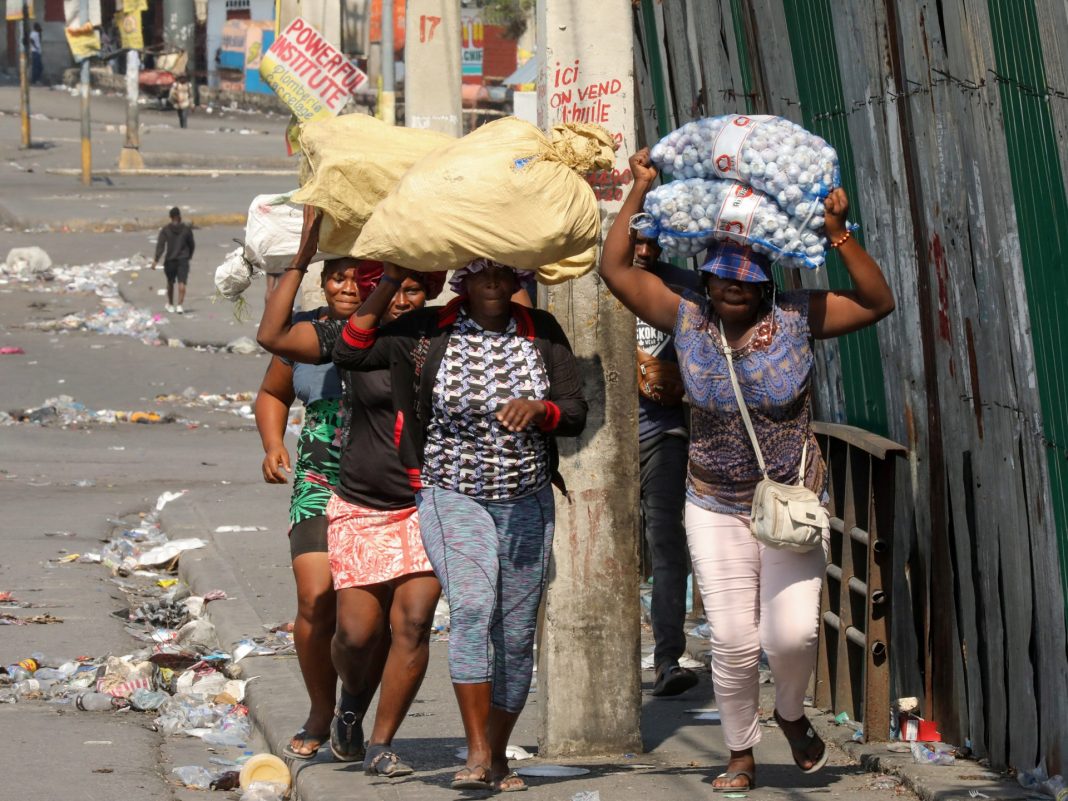Haitians have been plunged into a deepening crisis, as gang violence forces thousands of people to flee their homes and businesses and schools to shutter.
On Thursday, Haiti’s government extended a state of emergency until April 3 in the Ouest Department, where the capital, Port-au-Prince, is located. It was first imposed on Sunday. The measure includes nightly curfews and bans on protests, although rights groups have said they have done little to stem the violence.
A new police station was also set on fire on Wednesday night in the Port-au-Prince neighbourhood of Bas-Peu-de-Chose, according to a statement that the leader of the SYNAPOHA police union gave to the Agence France-Presse news agency.
The surge in violence began over the weekend when armed groups launched a wave of attacks in the capital, including raids on two prisons that led to the escape of thousands of inmates.
According to a SYNAPOHA tally, at least 10 police buildings have been destroyed since the start of the unrest.
Haiti has been plagued by widespread gang violence for more than two years, particularly in the wake of the July 2021 assassination of President Jovenel Moise. That killing created a power vacuum and worsened political instability in the Caribbean nation.
The country’s de facto leader, Prime Minister Ariel Henry, has faced a crisis of legitimacy and continuing calls to resign. Moise chose Henry for the post just days before he was killed.
This week, the head of the powerful G9 Haitian gang alliance, Jimmy “Barbecue” Cherizier, warned, “If Ariel Henry doesn’t resign, if the international community continues to support him, we’ll be heading straight for a civil war that will lead to genocide.”
IOM is deeply concerned for the people of #Haiti.
Gang attacks, kidnapping and gender-based violence have already led to thousands fleeing their homes. In recent days, we have seen further displacement, and the situation is deteriorating rapidly.
— Amy Pope (@IOMchief) March 7, 2024
Al Jazeera’s Teresa Bo, reporting on Thursday from Dajabon, a Dominican town on the border with Haiti, said displaced Haitians were being prevented from entering the country.
“We’re being told that the border is now closed,” Bo said. “Security forces here are on high alert.”
The United Nations said this week that at least 15,000 people in Port-au-Prince — where gangs are believed to control about 80 percent of the territory — have been forced to flee their homes as a result of the escalating violence.
The international organisation on Thursday warned that the country’s health system was on the brink of collapse.
“What we do know is happening [in Haiti] is that there’s looting going on, shooting going on. Businesses are closed. Schools, universities and most public services are not working because of the situation on the ground,” Bo added.
In the meantime, uncertainty continues to build around the fate of Henry, who was out of the country when the recent wave of violence began.
The Miami Herald reported on Wednesday that the United States had asked Henry to agree to a new transitional government — and resign — amid the growing crisis.
But senior US officials, including the country’s ambassador to the United Nations, Linda Thomas-Greenfield, denied that report.
“What we’ve asked the Haitian prime minister to do is move forward on a political process that will lead to the establishment of a presidential transitional council” to allow for elections, Thomas-Greenfield told reporters on Wednesday.
“We think that it’s urgent … that he moves forward in that direction and start the process of bringing normalcy back to the people of Haiti.”
Henry has been in the US territory of Puerto Rico since Tuesday, apparently unable or unwilling to return to his strife-torn country. He recently visited Kenya to rally support for a multinational security force to assist in Haiti’s fight against gang violence.
What comes next?
The National Human Rights Defense Network, a government accountability group, said there is little hope in stemming the violence under the current circumstances.
In a position paper released on Wednesday, the network said the unrest has been fuelled by collusion between the “hierarchy of the Haitian National Police” and criminal gangs, who continue to benefit from the “protection of Haiti’s judicial and political authorities”.
“Today, the facts are clear: The government authorities have resigned. The streets of the capital and the entire Ouest department are given over to armed bandits,” the group said. “And the Haitian population has simply been abandoned to its fate.”
The group called on “vital sectors” in Haiti to “provide the country with a non-predatory government of human rights, made up of men and women of integrity” — one that is committed to building functioning institutions, dismantling gangs and routing corruption.







